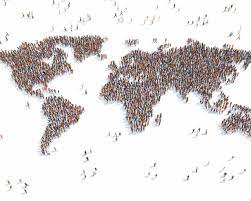Our Shared Planet
Jul 10th, 2022 | By admin | Category: Environment/SustainabilityBy Suzanne York.
Most people learn about the importance of sharing at a young age. It is a crucial behavior trait to learn for the good of individuals and society. It is also critical to understand the role of sharing from a planetary perspective. Human beings – nearly all 8 billion – share the Earth with other species. An obvious statement but one that seems to get overlooked.The world is facing innumerable crises and we need long-lasting, sustainable, rights-based and transformative change now, grounded in an understanding of a shared planet. This World Population Day (July 11th) offers an opportunity to engage people on our many global challenges.
According to the United Nations Department of Economic and Social Affairs, “Even though the pace of global population growth will continue to decline in the coming decades, the world population is likely to be between 20 and 30 per cent larger in 2050 than in 2020.
The United Nations Population Fund noted the following important point:
While the populations of a growing number of countries are ageing and about 60 per cent of the world’s population live in countries with below-replacement fertility of 2.1 children per woman, other countries have huge youth populations and keep growing apace. But focus should be on people, not population. Reducing people to numbers strips them of their humanity. Instead of making the numbers work for systems, make the systems work for the numbers by promoting the health and well-being of people.
It is indeed a matter of acknowledging actual people over numbers and addressing the needs of humanity, along with the rights of all species to a thriving and sustainable planet.
A report this past May by the Stockholm Environment Institute (SEI) and the Council on Energy Environment and Water underscored the urgent message that the world is at a boiling point and must take action now for the sake of all living beings. “…humans are causing unprecedented change to the global environment and are risking tipping points with major and irreversible changes in our lifetimes,” wrote the authors, where our present situation is exacerbated by unsustainable production and consumption patterns and inequality.
Due to human activities, the world is likely experiencing the Sixth Mass Extinction, losing species at a rapid rate, with 1,000,000 species threatened with extinction. There is good reason reason why this geologic epoch is now being called the Anthropocene.
So people need Nature; however, Nature does not need humans. The recently released IPBES Species Assessment report emphasized this point, noting that 50,000 wild species meet the needs of billions worldwide, relying on Nature for “food, energy, materials, medicine, recreation, inspiration and many other vital contributions to human well-being.”
It is crystal clear that a change in course is badly needed. The global economic system is based on continued growth and exploitation of planetary resources and flora and fauna, as well as humans. It is a broken system that benefits the few at the expense of the many.
The solutions are out there, waiting to be implemented across the board in most countries. This includes investing in women’s rights, reproductive rights, girls’ education, rewilding, alternative economic systems based on human and planetary well-being, and supporting the rights of nature.
Failure to implement solutions now is only making it that much harder and creating more problems for current and future generations.
Suzanne York is Director of Transition Earth.

![[Image credit: Image by ejaugsburg from Pixabay]](http://populationgrowth.org/wp-content/uploads/2022/07/environmental-protection-g531aef193_1920-300x200.jpg)
